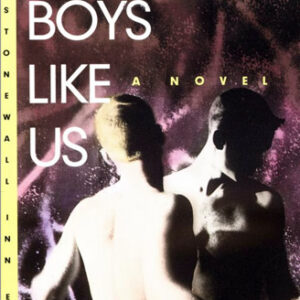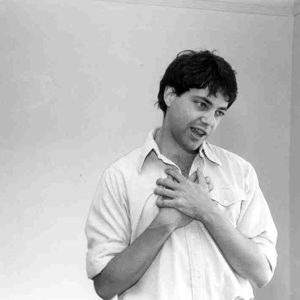calsfoundation@cals.org
Peter Gregory McGehee (1955–1991)
Gay Arkansas-born novelist Peter Gregory McGehee was praised by reviewers for his outrageous comedies of Southern manners, in particular the sly humor with which he explores what he saw as a hypocritical society that easily rationalizes its own moral lapses even as it enforces a narrow, judgmental morality upon others.
Peter McGehee was born in Pine Bluff (Jefferson County) on October 6, 1955, to Frank T. and Julia Ann May McGehee. The middle of three children, he was six years old when the family moved to Little Rock (Pulaski County), where he attended Forest Park Elementary School and, in 1973, graduated from Parkview High School. Shortly before he would have completed a BFA degree at Southern Methodist University in Dallas, Texas, he moved to San Francisco, California, where he worked at various odd jobs while writing plays. There, he performed in a satirical musical review titled, The Quinlan Sisters, for which he wrote the lyrics. The musical toured in cities in Oregon and western Canada. While in San Francisco, he met Doug Wilson (1950–1992), a visiting Canadian gay rights activist, with whom McGehee would be closely allied for the remainder of his life.
In 1980, McGehee immigrated to Canada to be with Wilson, living initially in Saskatoon, Saskatchewan, and—apart from a period spent in New York City for immigration purposes—in Toronto from 1983 onward. He wrote and performed in a one-man play (expanded and later published as the novella Beyond Happiness, 1985) that toured central Canada, New York, and San Francisco. He continued to perform in and write new material for The Quinlan Sisters as well as for a two-person revue, The Fabulous Sirs.
In the fall of 1988, McGehee was diagnosed to be HIV-positive. The progression of his HIV infection into full-blown AIDS in the spring of 1991 left him little time to enjoy the success that followed the publication of his first novel, Boys Like Us (1991), which was praised in the New York Times and elsewhere for its comic vitality and witty yet natural-sounding dialogue. McGehee was able to complete a second novel, Sweetheart (1992), and a collection of short stories, The I. Q. Zoo (1991), before his death; both works appeared posthumously, the latter only a week after his death. Relying upon brief notes that McGehee had left for a third novel, Wilson wrote Labour of Love (1993), a narrative that makes use of the characters McGehee developed in Boys Like Us and Sweetheart, but which makes such a radical departure in tone and narrative stance from McGehee’s works as to be related only tangentially to them. Wilson’s novel contains, however, a moving fictionalized portrait of McGehee’s last months and death.
The Arkansas River is “the saddest little river / That you ever saw,” sings Stellrita, the Black domestic who dominates the lives of three generations of the family of Zero MacNoo, McGehee’s fictional counterpart in Boys Like Us and Sweetheart. “Nobody writes books about it, / Nobody here’s got nothin’ to say. / ’Tain’t ’cause it ain’t worth mentionin’, / It’s just nobody smart stays.” Elsewhere, the narrator of one of McGehee’s short stories comments that Little Rock is the perfect place to “bottom out.” Thus, it is not surprising that neither McGehee nor Zero stayed in Arkansas. The character, like his creator, eventually moved to Toronto.
But like his fictional alter ego, McGehee returned repeatedly to the state of his birth, at least in his imagination. (It’s “the Tennessee Williams in me,” Zero says, explaining why he feels compelled to revisit a property that fell out of his immediate family’s possession years before.) Major stories or episodes in his novels are set at the IQ Zoo in Hot Springs (Garland County), at the Capital Hotel in Little Rock, in a rural Black church, and in a family cemetery. Such Little Rock locations as Robinson Auditorium, Central High School, the Quapaw Quarter, Little Rock Country Club, Graffiti’s restaurant, and Discovery discotheque anchor texts in which even then-governor Bill Clinton and his wife Hillary Clinton make a joint cameo appearance. The ambivalence of McGehee’s feelings toward Arkansas is suggested by his poignantly fictionalizing in “The Ballad of Hank McCaul” the suicide of a gay man after his name, and those of twenty-two other men caught on videotape in a public restroom in a rural Arkansas community, was released to the local papers by the county sheriff; and, alternately, by his campily creating a boisterously oversexed Latino drag queen in Boys Like Us whose signature number is “a stunning version of ‘I’m Just a Little Girl from Little Rock,’ starting out as Carol Channing and ending up as Marilyn Monroe.”
McGehee died of toxoplasmosis on September 13, 1991. His body was cremated in Canada.
For additional information:
Frontain, Raymond-Jean. “‘A Madhouse of Thanksgiving’: Peter McGehee, AIDS, and Screwball Comedy.” Philological Review 32 (Fall 2006): 79–109.
———. “‘No one Smart Stays’: Peter McGehee and Arkansas.” Arkansas Review: A Journal of Delta Studies 37 (December 2006): 148–166.
———. “Peter McGehee.” GLBTQ Encyclopedia Project Archives. http://www.glbtqarchive.com/literature/mcgehee_p_L.pdf (accessed August 10, 2023).
Obituary of Peter Gregory McGehee. Arkansas Gazette, September 15, 1991, p. 8B.
Raymond-Jean Frontain
University of Central Arkansas
 Literature and Authors
Literature and Authors Boys Like Us by Peter McGehee
Boys Like Us by Peter McGehee  Peter McGehee
Peter McGehee 




Comments
No comments on this entry yet.